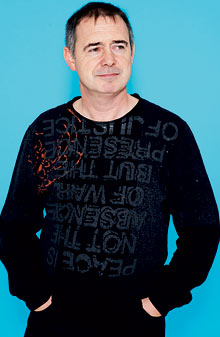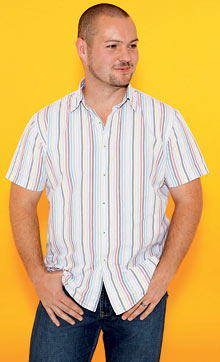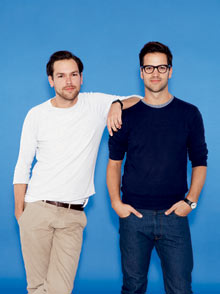More and more children are being adopted by same-sex couples. In the past two years the number of gay men approved to adopt has doubled. Here we listen to some of their stories.
Peter, 44, and his partner adopted brothers Carlos, eight , and PJ, four.
 Peter, 44, and his partner adopted brothers. Photograph: Ellis Parrinder
Peter, 44, and his partner adopted brothers. Photograph: Ellis Parrinder You never know what prejudices you will come across. If you approach an agency about a child or sibling group, they are at liberty to say you don't match the profiles of these children, and you hear nothing from them and you don't know why that is. Even at the recruitment stage, you might hear agencies saying they've already got a gay or lesbian couple on their books and they're not looking for any more, or because you're white you can't go on their books, or because you're gay you'll not get children under five. It isn't an even playing field. But maybe that will change when social workers have more experience of kids doing just as well in gay- or lesbian-headed households.
The statistics from the National Adoption Register suggest gay and lesbian adopters are more open to older kids and sibling groups, and also we're more ethnically mixed as couples than heterosexuals. We represent a different profile of adopters. And being gay or lesbian should help you relate to the experiences of these children, because they've experienced difficult starts in life, they feel different and excluded and aware that other children haven't had similar experiences.
There are a lot of very supportive, well-meaning social workers. But sometimes they can impose a hierarchy of adopters in which married heterosexual adopters with money are at the top and a single, gay, white man would be at the bottom – a single, gay, black man would be higher, since they are keen to match ethnically (most gay and lesbian adopters think they were never going to have children who were going to look like them anyway, so what does it matter?). The law is just about giving gay and lesbian adopters an equal opportunity to apply.
I don't necessarily disagree with lots of stereotypes about gay people – it's the way that they are used to suggest that we are less worthy as parents that's the problem. There's still a heterosexist attitude, where everything straight is seen as better because it's the norm.
You spend months talking to your child's social worker, and to the family-finder whose job it is to match you. We only saw one picture of the boys and read a 200-word profile to begin with – although as it gets closer you get huge documents and masses of files. Then you might first get to meet their foster carer, or a birth relative who is positively inclined towards the adoption. Next, you might get to meet the child for an hour one day, and the next day a whole morning, then the next day you might put them to bed or to take them to the park. So over time you get to know them – maybe a few days if they are small and a month if they're older, and there's a transition where they begin to understand who is responsible for their care. Ours was over 12 days. Our boys attached to us very quickly and it was lovely, a really beautiful time.
We're lucky to be in a school with other children with gay and lesbian parents. I think it is more difficult for people who don't have that, as school very much becomes your world. We know lots of kids who've got a dad and a stepdad. When other kids visit they might think: "Oh, your two dads live together", but I don't think our kids even see us as different, and other kids don't seem to notice.
It's a challenging thing taking on children of a certain age – they've got histories and attitudes and experiences and friends and attachments to people they might not see again. Most people try to give their children the sense that, notionally at least, their birth parents did love them even if they weren't cut out for parenting.
Paul is 49 and has been with his partner Matt, 41, for 19 years. They adopted brothers Harry, eight, and David, six.
 Paul, 49, has adopted brothers with his partner. Photograph: Ellis Parrinder
Paul, 49, has adopted brothers with his partner. Photograph: Ellis Parrinder My partner and I talked about adopting one night after we'd had our civil partnership ceremony. We'd been together 15 years and were thinking about what we could do that might help someone. We were so naive – we didn't know who we could adopt or foster; we thought perhaps we could only foster a child of, say, 12, who was in a difficulty for six months or something. Then we started to discover we could be taken seriously as adopters. We were told that often it's harder for a child to be adopted if they are older, that if they are sibling groups they're often at the end of the queue, waiting. It began to get quite heart-wrenching.
It took nearly three and a half years for us to adopt. The day we first met our boys was a shell shock. I remember naively asking about what happens if it doesn't go well and they're not the right ones – do we choose again? And the adoption staff said: "No, no, no – we've found the boys, you've all agreed that this might be a good match, it's happening, there's no going back. These are the ones." We went to the foster home with real trepidation – and because it was a foster home I had this vision of it being a run-down old house and lots of kids and a maternal lady in a pinafore. It was actually an immaculate house. We went up to this glass door and although we'd seen pictures of the boys we had no idea what they were really like, and there they were jumping up at the door, like puppies. They were two stunning little boys, just fantastic. It's a really artificial set-up of course, manufactured by the social workers, who say you'll have a cup of tea and you'll get to talk to them, but you mustn't pick them up, give them space, don't get too close. But it was a great three-quarters of an hour. And afterwards in the car, I said to my partner: "Let's not make too big a thing of this" and he looked at me and said: "You're joking? This is huge." We just knew as soon as we went in that it was going to work.
There was a lot of prejudice in the adoption system, even though it's not allowed and the law states you must treat everyone the same and with respect. There are still individuals who have difficulty getting over the fact that their values and mindset don't fit with what they have to do in their job. And now there's clearly prejudice when people realise the set-up. There's what I call the mummy prejudice – the boys misbehave in public and one of us dads will berate that child, and you get a clear sense from groups of women out with their kids that they think once those boys get home their mum will sort it out. And I'm thinking: it doesn't work like that!
People are quite innocent too – my children are darker-skinned than me, so people often ask if they are my kids and I'll say yes, and they'll go: "Oh. How come?" And this will be in front of the boys.
Their school is absolutely brilliant. It's the first time they've had adopted children with same-sex parents, and they're very sweet – they take you to one side and say: "What should we do on Mother's Day?" We say they can make a card if they want to – although someone did once say: "But they haven't got a mother." To which I responded: "Well, how do you think they got here?"
Times have changed immensely: I put myself forward to be a governor and I got voted in by the parents who know all about me, which is fantastic, because I'm old enough to remember being too scared to ever tell anyone I was gay.
People focus too much on the fact that two men can't have a child. But what they forget is that adoption is not about starting a child – it's about taking over and parenting damaged children, and that's a skill. I'm not putting us up on a pedestal. All I'm saying is that we're a real resource.
Zoltan, 38, and Mark, 35, have been together for 11 years and officially adopted five-year-old Lucia two weeks ago.
Zoltan: I was fostered myself and I wanted to give something back, as it were, and Mark has a really magical quality with children. Kids just feel really comfortable with him. At first we wanted to foster. We went through the fostering approval processes, and our very first placement was two little girls, half-sisters Natalie and Lucia. After a while it became clear that they were never going to go back to their mother and so, two and a half years after she was placed with us, Lucia is now our daughter. The initial plan was for them to be adopted together, by us. But in the end Natalie's real father wanted her (he's not Lucia's father).
The local authority was very pro us adopting, but we did have difficulties trying to foster. Once you're approved to foster you go on a list, and when social workers have an urgent or planned child to place they go down the list and start phoning people. Five or six times we had false starts – we'd be told a child was arriving and then it didn't happen. I got suspicious, because we were the only male, same-sex couple registered in the borough. It got to a point where we were supposed to be doing respite care with two boys in foster care, and we think their biological family vetoed us, even though the children had been removed from them. So I said to the authority: "You need to assess what your policies are, because this looks like homophobia." I was very tough and a week later, Lucia and Natalie arrived.
The first social worker who came to assess us said: "Would I want my child to be adopted by two gay men? I don't know…" and then she went: "I think I would." And that was her mind made up.
The first adoption panel was a bizarre experience. The maximum number of people on the panel is 15, but, perhaps because we were the only male same-sex couple in the borough, there were 17.
The whole process is in some ways fantastically well thought out and set up: you're assigned a social worker and there's one for the child, plus independent legal representatives who are supposed to represent the children. That's good, but the risk is that people have different ideas and agendas; we felt that one of the legal representatives was homophobic.
The kids in Lucia's class know everything, and there are other children with same-sex parents too. Kids will come up to us and say: "So you're Lucia's daddy?" Yes. "And she's got two daddies?" Yes. "Why?" And then another one says: "Cos her mummy's poorly." It's great. The school has been so supportive – they asked what they could do and who they could write to, and when we told the headmistress two weeks ago she was in tears.
Mark: Sometimes the stress and pressure became immense – we both stormed out at times. But Zoltan's my whole life and we're as solid as a rock. We'd been together nine years when we started this. In Lucia's eyes we're Daddy Markie and Daddy Zoltie. She's very assertive – if I'm helping at her school I'll be surrounded by kids and she'll come pushing through them, saying: "That's my daddy." Lucia's been with us throughout this process, remember, and she's been overwhelmed by it, I think. She's had a lot of uncertainty, and you forget how much they pick up. But two weeks ago we were finally able to say: "You are now our daughter." She got straight on the phone to my mum and says: "Right, Nan, now I'm adopted, what we're going to do is sort my bedroom out" and off they went and bought new curtains.
Simon, 36, and his partner have been together for 12 years. They adopted David when he was six, two years ago.
 Simon, 36, adopted David in 2007. Photograph: Ellis Parrinder
Simon, 36, adopted David in 2007. Photograph: Ellis Parrinder Our adoption was very smooth. We started the process in 2006 and it took us about 18 months to get approved and then about six months to actually find our son. He moved in with us two years ago. We were the first gay couple to go through the process in our area, and our local authority gave us so much support. We live in a small village and they've all been good too – we've always been very open, and they knew from day one what we were doing and were more curious than anything.
At first he called us by our first names. Now he calls us Dad and Daddy – I'm Dad, James is Daddy. I think that'll peter out – he won't want to call James Daddy when he's 16. It came naturally that he called me Dad because, as I like to put it, I had my maternity leave, so I was off work for nine months and with him all the time; James was there evenings and weekends.
There's always going to be a degree of prejudice about gay adoption. But these children have come from incredibly bad backgrounds – what they've experienced in the early parts of their lives an adult would find very hard to cope with. These children have one or two loving parents – someone who loves them, who'll give them cuddles. Whether they're a gay or straight couple or a single person, as long as the child is getting support it doesn't matter. The odd person in the village said they weren't sure about what we were doing – that a child needed a mummy and a daddy – and I agree. But when that's not available, there's the next best thing.
Rodney, 41, is single and adopted Sebastian, four, in January.
There are very few men who adopt on their own. I wanted children but never met the right person to do it with. Normally single men who adopt are men who've worked with kids, or who know a particular child and then adopt them. It's quite rare to adopt like me, just because you want to have a child, although it is happening more and more. My agency had never had a single gay guy adopt. I've since been approved to have another child under two, but there are some difficulties. I'm finding it hard to get the authorities to believe that a single gay man is fully capable of bringing up more than one child.
Probably the weirdest thing was that once they've made the match and approved you, you start the process of getting to know the child by making a little storybook about yourself and a DVD of yourself, and the house and your car and their new toys and their room, where they might eat and so on, and they might watch that every day for a week, so they've got a bit of an idea of what to expect. Because I'm single I got a friend to help me, and I pretended that a stuffed giraffe was showing him round the house – it had to be age-appropriate and he was three. He called me Daddy from the start. Lots of tears – it was an incredibly emotional time. My best friend went through the process with me – to have someone at every stage was something I really needed – and then my sister moved over from Australia for 18 months to help. Plus the agency was very clear that I needed a strong support network.
The funniest thing is that 99% of people tell me how lucky Sebastian is, but I feel like the luckiest person in the world. People think we adopters are all doing something great, but it's the best thing I've ever done.
Guy, 31, and Richard, 32, have been together eight years and are in the process of adopting.
 Richard, 32, and Guy, 31, are in the process of adopting. Photograph: Ellis Parrinder
Richard, 32, and Guy, 31, are in the process of adopting. Photograph: Ellis Parrinder Guy: We both always knew we wanted children. We did look into surrogacy very briefly and quickly realised that it was incredibly complicated and expensive, and also knowing that there are children out there who need homes, we didn't feel comfortable with going through all that effort.
As with any couple talking about having kids, you always think: "One day, one day", but now we're really going through the steps. It's a big jump. We bought a house and as soon as we'd fixed it up, we were like: we're ready.
I'm relatively young, so I don't really know anyone else doing this. Until we joined support groups we didn't know any gay couples who have kids, although we have a few friends who are gay couples and are thinking about the same things, or about artificial insemination or surrogacy. In our support group there are older men adopting who 15 years ago found it was impossible. But still, we definitely feel like pioneers.
Richard: There is a certain lifestyle that people associate with gay men rather than gay women. It's not something I've ever identified with. That Queer as Folk lifestyle. There are some great representations of same-sex relationships, but things are often tarnished with that brush of being wild and noncommittal and brash. So it's nice to meet men who have taken that same step of wanting to or actually having kids. It's also generational. Older couples are now out of the closet – my friends have gay neighbours who are in their 60s who have been together 25 years. Ten years ago you wouldn't have seen that – they would have kept a lower profile. But nowadays you realise it's a valid choice and, no, you don't have to go out in Old Compton Street every night.
We are very early on in the process – we have made calls and enquiries, read books and talked about it for a long time, and we just had our first informal meeting with a social worker. Last week they said they would take us on and assess us. Next it's the approval process, which involves six to nine months of meetings, reports and statements from friends, prep groups, and then you hopefully get matched with a child, then there's another panel that makes sure the match is a match. This can take a lot longer for same-sex couples because the kids' social workers can sometimes disregard you in a way they wouldn't disregard others.
However, the available kids are usually black or of dual heritage, so we as a white couple can't really help them out. Most problems have been because we are Caucasian rather than both being male. I think this, in part, is because people can no longer express any homophobia directly, as it's so against their policies now. I think a lot of the local authorities are under more pressure to recruit same-sex adopters. So it's actually a positive time to do it.
Ideally we would like two children, and that also helps in terms of age range. Babies are rare. Aged two to five is the most competitive area, and there you are competing with more conventional couples. So we are open to most ages. There is such a vast difference between the ages, and it's hard to know if you don't actually have kids. At the start of everything, there are a lot of questions about what you would like and want and will or won't accept, and I find it quite surprising, as you just don't know. You are talking about individuals. An eight-year-old needs a home as much as a four-year-old.
The children's names have been changed.





 We couldn't help but wonder:
We couldn't help but wonder: The brilliant headline "Restless Vagina Syndrome" had me primed to giggle at whatever Terry J. Allen
The brilliant headline "Restless Vagina Syndrome" had me primed to giggle at whatever Terry J. Allen 



